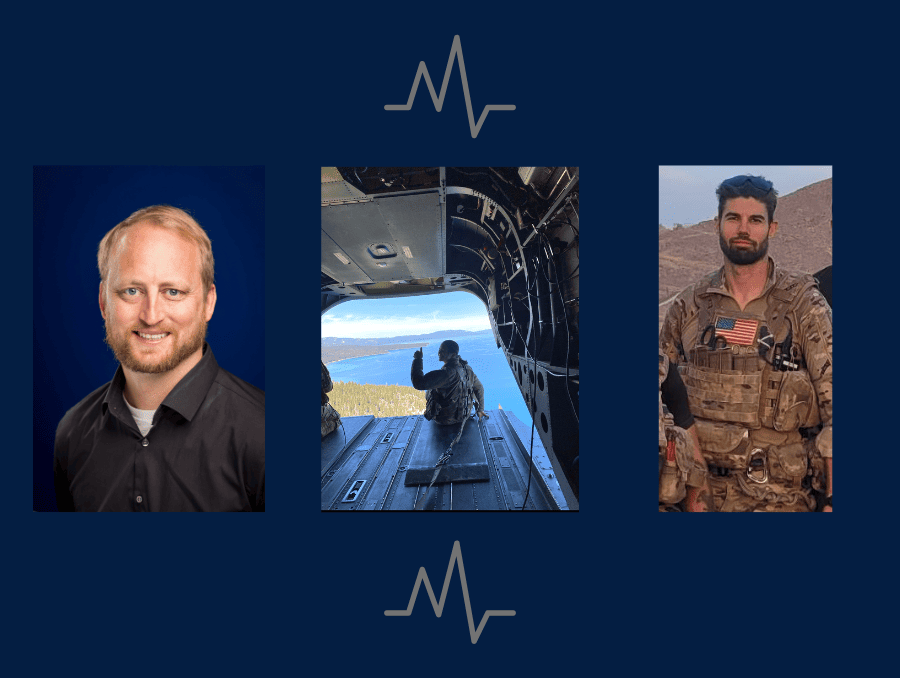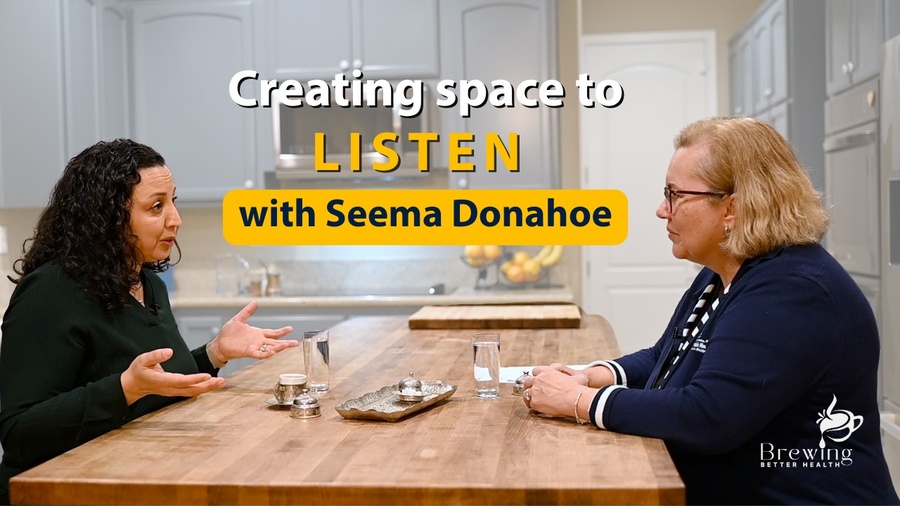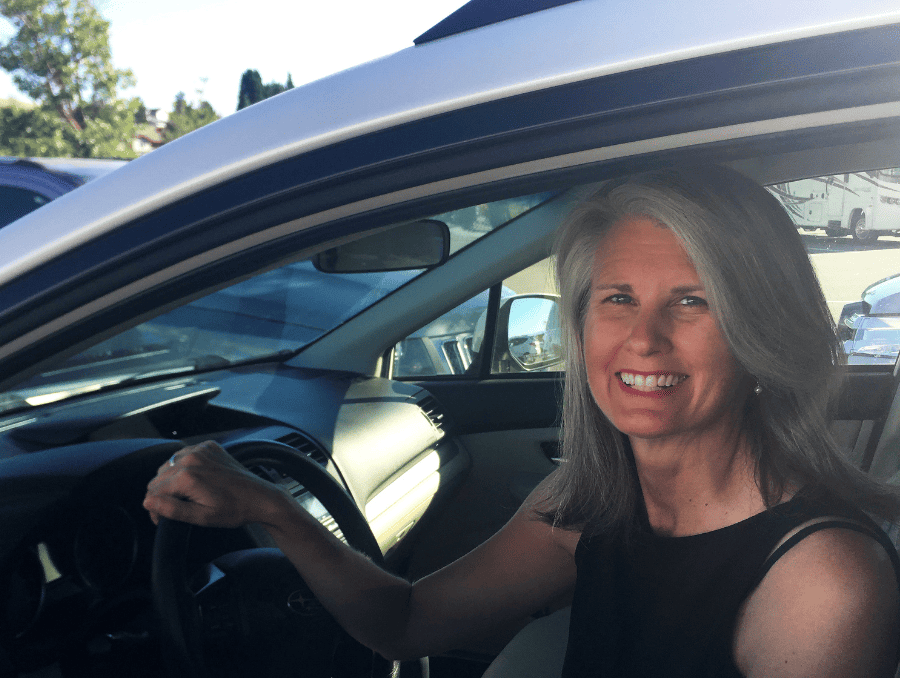The medical field and military service share a common purpose — a desire to serve others. The University of Nevada, Reno School of Medicine (UNR Med) offers an opportunity for individuals to find additional ways to serve in a variety of health care tracks. In honor of Veterans Day, UNR Med is spotlighting three student veterans from the Doctor of Medicine (M.D.), Physician Assistant Studies (PA) and Speech-Language Pathology (SLP) programs whose journeys from military service to medical training reflect a continued commitment to serving others.
Adam Crabtree – M.D. Program
Adam Crabtree joined the U.S. Army in 2011 as a Special Forces medic, commonly known as a Green Beret. It is a three-year pipeline to become qualified. He served 14 years and completed 10 deployments. He is currently a second-year M.D. student.
“Going to medical school and becoming a physician was a completely foreign concept to me growing up. I came from a blue-collar family and worked construction throughout high school – expecting I would eventually go into the trades. However, inspired by physicians who provided compassionate care to my family, I became an emergency medical technician (EMT) in hopes of one day becoming a physician.
The events of 9/11 inspired me serve, but due to family circumstances, it didn’t work out right after high school as I decided to stay close to family and instead worked as an EMT and firefighter. After graduating with my bachelor’s degree in biology from the University of Nevada, Reno, I knew I wasn’t quite ready to apply to medical school just yet. I wanted some adventure, and I still had the desire to serve, but now in a way that incorporated my passion for medicine. I put ambitions of medical school aside, knowing that if I didn’t join when I did, I probably never would, so I went for it.
My time in the military was incredible – challenging, exciting and full of adventure. While there were certainly difficult times, especially during several deployments, I had incredible training and traveled the world. I worked with a phenomenal team of physicians in the U.S. Army, and I am truly grateful for their support, mentorship and friendship throughout my career. Without them I would not be here. My military experience not only galvanized my calling to continue the pursuit of medicine at a higher level, but it also reminded me of what is truly important – family. Reno is where my family is, and one of the main reasons I came to the University of Nevada, Reno.
While everyone must separate from the military at some point, I knew it was my time. I had done enough and am now very eager to devote myself to medical school and further explore my passion for medicine as a physician. I hope to apply my medical training and military experience to solve critical issues affecting the health of my local community with the same passion and commitment I gave during my military career.
Transitioning from any career is challenging, but what is unique for veterans is you are leaving an insulated system. Housing, health care, financial stability is essentially guaranteed. You have purpose, direction and a robust support system of teammates. Almost immediately after you leave the military, that is all suddenly gone. I have seen many veterans struggle with this drastic life change – I think this is mostly attributed to loss of personal identity and purpose.
Additionally, when you’re in the military, the pace can be relentless so that there is no time to process potentially difficult experiences until you get out and have time to think about it. Post-traumatic stress disorder (PTSD) was something I ignored for a long time, having experienced several highly kinetic deployments, but when I started my transition process back to civilian life, I knew it was time to address these issues in a healthy way.
It is a big deal saying goodbye to the people you knew and worked with every day for so many years. Finding new community and a robust support system is vital to those transitioning out of the military - this is partially why I wanted to come to the University. I have felt supported and insulated since day one. I am incredibly fortunate to be here at UNR Med and am grateful to everyone who has welcomed me with open arms.
Veterans need a support system during their transition – school services are only one piece of the puzzle, while other veterans can help each other fill that need. I stay in touch with other veterans and am a member of an organization that recruits and mentors Special Operations medics into medical school, which allows me to give back to a community that has given me so much.
Veterans Day can be a difficult time of year for me, I think more of the people I lost instead of my own service. I have never felt like I fully deserved the recognition I’ve received and instead place all appreciation on those that came before me and helped me get to where I am today. I recommend veterans talk about their experiences - there is a disconnect between veterans and the public who do not know how to talk to someone who served. Veterans need to talk, and people need to understand what they went though, or their experiences and knowledge will be lost.
Being a veteran can be an isolating experience and encouraging healthy dialogue between civilians and veterans would be highly beneficial. Don’t be afraid to reach out, ask open-ended questions and try to learn from our veterans. Also understand that some veterans may not be ready to talk about their experiences, it may take time for them to open up and that is ok.
My service helped shape who I am today, it showed me what I am capable of and galvanized the values that I hold dear. I know who I am and the person I want to be, which will also shape the medical career I pursue. I want to be present for both those closest to me and my patients.”
Katie Mulligan – Speech-Language Pathology Master’s Program
Katie Mulligan is in the U.S. Army National Guard as a Chinook helicopter mechanic. She enlisted in 2020 and moved to Reno in 2021 from Las Vegas. She is currently pursuing a master’s degree and is set to graduate spring of 2026. She hopes to have a job in a specialized children’s hospital.
“I have always wanted to serve my country and was considering joining the Marine Corps, but the Lord led my family to foster care, and my parents adopted my siblings. The children that we served led me to the field of speech-language pathology. I wanted to work with children; however, I still wanted to serve, so I joined the National Guard, and found out that they would pay for my education. It was the best of both worlds. I get to serve both my country and my community.
I will leave the National Guard in December, but it has shaped everything. My time in the U.S. Army has encouraged group collaboration and diversity. I have worked with people of all different backgrounds from all different places. The military taught me that hard days will come, but you can’t get wrapped up in them. Be happy and positive as well as empathetic but also objective. In the moment, you have a job to do.
UNR Med has shaped me more in terms of how I could serve my community as a medical speech-language pathologist. Kristine Galek, Ph.D., CCC-SLP, has been a fantastic mentor. These two very different parts of my life work together because when I switch gears to work in the other field, I can approach it feeling refreshed and ready to learn and grow.
The military has shaped everything. It has taught me that all the work will get done, time is very valuable, and you can leave work at work. If there are good times, cherish them. Bad times? You will get through them. Time is always moving.
My brother got back from deployment, and I have seen other people struggle to transition, so saying that my transitions are difficult would minimize their sacrifices. I am blessed in the National Guard, and it has actually made transitions easier; I get to frequently jump in between my U.S. Army and civilian duties, which has trained me to invite change and transition.
My grandpa served in the U.S. Navy as a captain and continued flying into his 70s. He is the smartest and most compassionate man. On Veterans Day I think about him and “Mustang 22,” one of my unit's crews that was shot down in 2005. Those from the military will carry trauma their whole lives and I respect that sacrifice. As a ground mechanic, I am part of the support crew, and I take pride in that. Doing the groundwork to support those who sacrifice every day in both their military lives and civilian side is an honor. I take that with me into my medical field.
I have always been surrounded by those who respect military and supported them, so I knew what that looked like. I acknowledge the freedoms I have in this country, like getting a degree and working in a female-dominated industry, which is made possible because of those before me. There is a reason I get to do what I am doing, and I constantly consider the freedom we have and respect all those who made it possible.
In the military, everyone is coming from a different past and is going through something under the surface. Knowing and understanding this fact, I think about the parents and children who come to speech therapy who are also fighting their own battles every day. They are serving themselves, their families and their communities in their own way. It is an honor to be able to meet them where they are and help them through in any way I can.”
Josh Odle – Physician Assistant Studies Program
Josh Odle served in the U.S. Marine Corps for roughly five years and honorably discharged in 2014. He served as an Air Support Operations Operator and squad leader. He is currently in the PA program.
“After high school, I attempted to attend college, but as a first-generation college student, my first experience did not go as planned. Unsure of my next steps, I reflected on the stories my father and grandfather, both Marines, had shared with me. Their experiences inspired me and made the decision clear: I would enlist in the Marine Corps and become a third-generation Marine. My experience in the U.S. Marine Corps changed me for the better. I left the service a more confident individual, driven by a strong desire for personal growth. It instilled in me the mindset to keep my head held high, even in the face of failure, and to view every challenge as an opportunity to learn. Most importantly, after spending the majority of my enlistment overseas, I gained a deep appreciation for what I once took for granted.
Two moments have stayed with me, both involving humanitarian missions. The first was in Thailand, where I helped distribute basic medical supplies and observed a Navy physician assistant working with the local population. Despite language barriers, they had learned enough Thai to communicate effectively, and address patients’ needs with professionalism and compassion. The second was during the 2011 earthquake and tsunami in Japan. Our team was deployed to assist and witnessing the collaboration and dedication of medical professionals as they cared for those in need was truly remarkable. These experiences opened my eyes to a future in medicine and inspired me to one day provide a calm, helping hand to those who need it most.
The ‘keep your head down and keep moving’ mentality has been the driving force behind my perseverance throughout the PA program. It’s something that was instilled in us early on, no matter the challenge, always keep pushing forward. While it may sound cliché, this mindset has consistently helped me succeed. Regardless of how demanding or fast-paced the coursework becomes, I remain focused and determined, knowing that persistence will carry me through to the other side.
I was fortunate to have time after leaving the military to adjust before applying to the PA program within the medical school. Having several years of college and work experience prior to applying has helped me transition to civilian life and better manage the challenges of returning to an academic environment.
Veterans Day to me is a day to express gratitude to others. It is a time to honor those who signed their name on the dotted line and committed themselves to serving our country. Although I have also served, I take this day to thank the generations who came before us, those who paved the way and set the standard we strive to uphold. I am proud to have followed in their footsteps.
It may be different now, but when I first joined the military, and even after I got out, there was a persistent stigma that veterans were prone to instability or lacked intelligence. During my undergraduate studies, I was often met with surprise that a Marine was in college alongside them, which I found baffling. Veterans are a true reflection of the diversity of the United States, a melting pot of backgrounds, experiences and perspectives. Some of the most intelligent, compassionate and driven individuals I’ve ever known served in the military.
Throughout my service I have developed values such as empathy, integrity, teamwork and a deep sense of responsibility to others. These values have shaped the way I connect with people, especially in challenging or vulnerable situations. As a future physician assistant, I hope to carry these same principles into every aspect of patient care.”
















